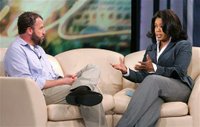
Jonathan Frey in Oprah's studio woodshed
I was struck by a number of interesting issues that emerged from this:
1) Why would Frey have subjected himself to what he must have known would be a public whipping? Was he that repentant for what he had done? Was he in denial? Or was this a choreographed apology?
2) Oprah lost points in my book for pinning the blame entirely on Frey. Is she so naïve to think that authors don’t lie or embellish? Did her own staff miss important red flags about the veracity of the book? Will she do anything to make sure this doesn’t happen again?
3) For all her folksiness, Oprah is a commodity with a corporate image to protect. Yesterday’s flogging was about damage control. No different from Tylenol, Coca-Cola or Pepsodent.
If I had to put money on the most likely scenario, I’d say there was some level of collusion between Oprah and Frey. Before the revelations, she may have given a wink to the book’s wild assertions. She’s been around, after all, and should be able to spot howlers when she sees them. More probably, though, she persuaded or coerced Frey to appear on her show again. How much money would saving her image be worth to her? Was Frey less a villain than a willing and handsomely-paid “victim”?
A Swing to Truth
On the other hand, there’s something positive came from this experience. The recent years have seen a decline in the ability or desire of people to stand up for or believe in objective truth. We try to be tolerant of each other’s faith, for instance, but this can easily slip into a feeling that all faiths are somehow the same – each telling its own version of the truth. Intelligent Design advocates battle evolutionists on this ground, hoping that their version of the truth (however baseless) will be allowed to stand along the version of the truth offered by science. On the talk shows, truth is the position that talks the loudest and prevails, regardless of its agreement with the supposed principles of the speakers or with the evidence.
But objective truth exists, however poorly we discern it. The truths of Christianity, in fact, completely lose their power if divorced from objective truth. Tell me that Christ is God incarnate -- who lived, died and rose on my behalf -- and I am obliged and willing to follow and emulate him. Tell me it’s a lie or a myth and I lose interest completely.
This week’s “Story of ‘O” is a good sign that we are swinging away from a culture moving away from objective truth – where memoirs can be inventions and the line between fiction and non-fiction ceases to matter or even be evident.

No comments:
Post a Comment